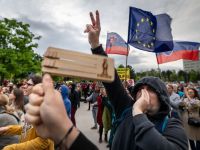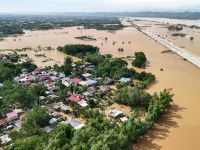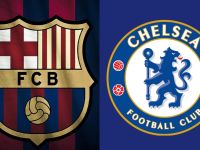The Lebanese Islamic Resistance party Hizbullah said in an official statement that Israel was behind the killing of former Lebanese minister and militia leader Elie Hobeika.
Lebanese President Emil Lahoud, in a statement issued by his office, said Lebanon "will not be influenced by such crimes," and he indirectly accused Israel by saying that Hobeika was assassinated by those who did not want him to testify in Belgium.
Other Lebanese officials, including Minister for Refugee Affairs Marwan Hamada, blamed Israel because "initial assessments are that Israel is not interested in evidence against it in the historic trial of Ariel Sharon, the past and present criminal."
Since last year, when Israeli Prime Minister Ariel Sharon has been facing a law suit in Belgium, where 1982 massacre survivors want Sharon tried for war crimes, Hobeika has been saying he wants to testify for the prosecution. As recently as this week, he told Belgian lawmakers visiting Lebanon that he has "revelations" that would clear his name and "tell a very different story than the Kahan commission."
But David Kimche, who as a top Mossad officer assigned in the outset of the 1980s by then-Mossad chief Yitzhak Hofi to develop ties with the Phalange, including Hobeika, told Israel TV interviewers that if Hobeika had taken the stand in Belgium, Israel would have been able to reveal much about him that would not have been in Hobeika's interests.
Israel’s Foreign Ministry Deputy Director General Gideon Meir rejected outright the accusations that Israel was involved. "Israel was not involved in this and we reject with disgust the attempts to blame us," said the ministry statement. Sharon, when asked about possible Israeli involvement, said the question did not deserve a response, while Defense Minister Benjamin Ben-Eliezer had to be reminded who Hobeika was.
Assassination
Hobeika was slain Thursday with his three bodyguards when a Mercedes, packed with explosives, blew up as he drove away from his residence in Hazmieh. Six other people were injured by flying glass and shrapnel.
The blast occurred at 9.30am, seconds after Hobeika left his apartment on Kamel Asaad Street on his way to the Dbayyeh Marine for a scuba diving excursion.
The bomb-rigged car was parked on the side of a narrow and winding road, making Hobeika’s Range Rover an easy target as it would have to slow as it passed it. According to the Daily Star, investigators said they believed two people were involved in the assassination, one giving a signal when the car rolled out of the garage, and another detonating the bomb by remote control.
Hobeika and his companions were killed instantly. His body was hurled 50 meters away by the force of the blast. The driver was decapitated.
The dark blue sports utility vehicle flipped over and ignited. Within minutes it was reduced to a pile of twisted and charred metal.
Five oxygen tanks that were in the car exploded, increasing the force of the 10 kilograms of TNT concealed in the Mercedes, according to explosives experts who arrived at the scene.
The blast was heard up to 3 kilometers away in Dikwaneh and Sin al-Fil, with many residents initially mistaking the blast for a sonic boom. Glass windows in a one-kilometer radius were shattered and the facade of a five-storey apartment building was blackened. (Albawaba.com)
© 2002 Al Bawaba (www.albawaba.com)







